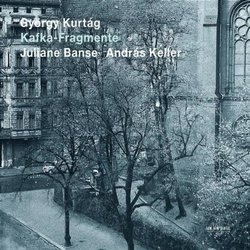| All Artists: Gyorgy Kurtag, Juliane Banse Title: György Kurtág: Kafka-Fragmente Members Wishing: 2 Total Copies: 0 Label: ECM Records Original Release Date: 1/1/2006 Re-Release Date: 3/28/2006 Genres: International Music, Special Interest, Classical Styles: Europe, Eastern Europe, Chamber Music, Historical Periods, Classical (c.1770-1830), Modern, 20th, & 21st Century Number of Discs: 1 SwapaCD Credits: 1 UPC: 028947630999 |
Search - Gyorgy Kurtag, Juliane Banse :: György Kurtág: Kafka-Fragmente
 | Gyorgy Kurtag, Juliane Banse György Kurtág: Kafka-Fragmente Genres: International Music, Special Interest, Classical
|
Larger Image |
CD Details |
CD ReviewsAs Fine a Performance as Any Available Grady Harp | Los Angeles, CA United States | 06/17/2010 (5 out of 5 stars) "György Kurtág's op. 24, 'Kafka-Fragmente' is as fine a way to become familiar with this contemporary Hungarian genius' work as any. Though he rarely repeats a concept in his work despite the fact that his music is now in the 'instantly recognizable' zone, this 1985-86 composition for violin and soprano holds moments of timbre and sonority - if that word can be used for atonal music! - that rise out of the mysteries of creation that cover his career. The composition is unique in that it depends solely on the ability of a soprano to accept the partnership of one instrument as accompaniment. But writing that statement immediately calls for a retraction: the soprano and the violin each hold equal value in these fragments from Franz Kafka's bizarre diaries. The ability of the violin to spread a pitch cluster over several strings invites the soprano to do the same - not necessarily of the sprechstimme quality but finding that inner place between two pitches that has yet to resolve in either direction. At times the violin dances and the voice dances, at other times the violin sans vibrato mourns and the voice groans and pleads. There are moments of snap and humor that are close to the Orientale sound: there are moments so mysterious that they seem to emerge from some other space unknown to anyone but the composer. Kurtag's Kafka Fragments is broken into forty brief settings and organized in four sections. The central motif is "the path". Kurtág goes to the very limits of what is technically possible, placing great demands on the voice and the violins, which cover a huge expressive range. The performances here by Juliane Banse, soprano, and Andras Keller, violin, are virtuosic. Both of these artists achieve the unachievable: they make this work sound simple to perform! Banse's voice is rich, like satin when she wishes it so and like a crisp penetrating dagger when the words call for that sound. Keller is inordinately expressive and his tone never is less than sure and beautiful, even when stretched by Kurtág's demands. This is music to live with in order to appreciate the richness of the score and the diligence of the performance. Highly recommended. Grady Harp, June 10" What lieder are all about Personne | Rocky Mountain West | 03/12/2010 (5 out of 5 stars) "Gyorgy Kurtag is gradually gaining the recognition he deserves. Songs for solo voice and solo violin? Sounds a little sparse, but nothing could be farther from the truth. These songs are fully-formed, expressive, evocative and deeply personal. These are duets in every sense of the word, with the full meaning conveyed by both performers. The poems by Kafka are perfect for setting. Each is a little fragment of a day, a thought, a sight. They are beautifully fleshed-out by Kurtag's thoughtful settings. Harmonies, even when only implied, are clear and purposeful.
The performers are ideal. Andras Keller's violin conveys warmth or steel wherever necessary. He is a supportive accompanist (not a trait one associates with violin) who gives the singer the confidence to probe the roles of each song. Julian Banse has a creamy tone that would suit many styles of music. She doesn't rely on her native gifts: she brings a real musician's attitude to these songs. She is a pleasure to hear. The recording itself is quite good. The listener gets the best seat in a medium-sized recital hall. Clear, but not clinical. The engineer doesn't always get credit for the pleasure of listening, but credit is deserved here. I find myself needing to hear this CD just "one more time". You will too." |

 Track Listings (40) - Disc #1
Track Listings (40) - Disc #1